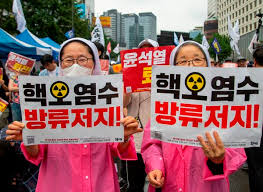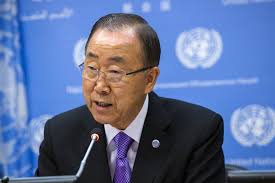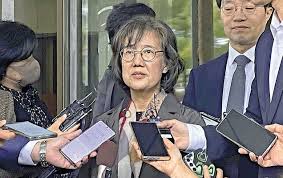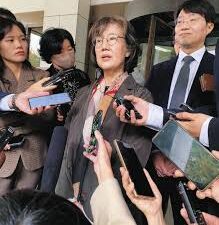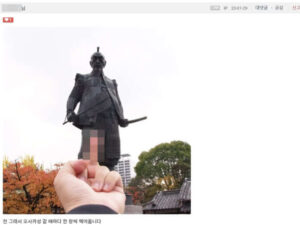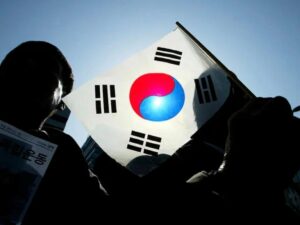Former President Moon Jae-in said that 1,368 people died in the Fukushima nuclear accident in Japan, which is a lie. The speaker was Ban Ki-moon, former Secretary General of the United Nations, who expressed his understanding of the “ocean discharge” of treated water from the Fukushima Daiichi Nuclear Power Plant that began in July of this year. He made the comment in a lecture at Korea University in South Korea (Chosun Ilbo, October 20, 2023).
However, despite his position as Secretary-General of the United Nations, Ban has distributed pamphlets in English describing the Sea of Japan as “East Sea” (2007), invited UN ambassadors to a New York performance of a musical about the assassination of Hirobumi Ito by An Jung-geun (2011), and made a speech in Beijing about China’s “Anti-Japanese War Victory” (2011). He is known in Japan as a hardliner against Japan, having attended a ceremony commemorating the 70th anniversary of China’s victory in the Anti-Japanese War and a military parade in Beijing (2015). Many may find it disconcerting that he would make such a tolerant statement toward Japan. What is behind Ban’s remarks, which seem to indicate a shift in his attitude toward Japan? Choe Seo-yeong, a South Korean writer living in Japan, asked. Ban’s image in Japan is different from his image in South Korea. When he was UN Secretary-General, he was criticized in South Korea for being rather pro-Japanese, for example, for thanking Japan for sending the Self-Defense Forces in peacekeeping operations and for his positive assessment of the 2015 comfort women agreement. I personally rate Ban as a rationalist, neither pro-Japanese nor anti-Japanese. I think that his statement was simply a statement of scientific and rational facts, and he did not intend to defend Japan in particular.” (Choi, same as below) Even within South Korea, Ban’s statement was received calmly, and no accusations of being “pro-Japanese” were seen this time around. There are Korean media outlets that properly criticize the false rumors circulating in South Korea about the Fukushima nuclear accident, and the attitude of showing understanding toward Japan’s handling of the accident is not a new story,” he said. There have always been many supporters of nuclear power in South Korea, and there is no particular opposition from the general public, other than from activists, regarding new construction or restarting of nuclear power plants. Even the discharge of treated water into the ocean does not bother most Koreans. As evidence, according to trade statistics from the Korea Customs Administration, imports of Japanese beer from January to August this year surged 2.4 times over the previous year, and has returned to the top position in beer imports. Tourists from South Korea to Japan reached approximately 4.9 million this year alone, topping the list ahead of second-place Taiwan and third-place China, and this momentum is not slowing down. (The “openness” of Korean society’s reaction to the release of contaminated water is reflected not only in such statistics, but also in the behavior of a member of the Korean National Assembly.
Kim Nam-guk, a member of the National Assembly (formerly of the Democratic Party of Korea and now an independent), who was known as a strong opponent of the discharge of treated water, including the unscientific claim that “the discharge of contaminated water from Japan causes deformities in offspring,” was spotted traveling in Japan on October 1 this year and was reported by the Korean media (Chosun Ilbo, October 3, Japanese edition). (Chosun Ilbo, Japanese edition, October 3). The article reported that . Congressman Kim had not even informed his own staff of this trip to Japan.
Post-Nuclear Accident Pressure for Renewable Energy Interests?
After the Fukushima nuclear accident, the South Korean government banned imports of Japanese marine products from eight prefectures, including Fukushima Prefecture, and ridiculed the 2020 Tokyo Olympics as the “radioactive Olympics. Why does it seem as if the wind has turned 180 degrees in Japan’s favor? The reason for then-President Moon Jae-in’s decision to stop nuclear power generation is thought to have been aimed at creating a shortage of electricity and funneling government subsidies into renewable energy sources such as solar power generation. In fact, solar and wind power are being built in a great many areas that are in the grip of the then ruling party (both DPJ). In other words, aside from civic groups and others, the Moon administration simply used the nuclear accident as a dodge to get rid of nuclear power. Although rarely reported in Japan, there has actually been a string of revelations since last year regarding the illegal receipt of renewable energy subsidies during the Moon Jae-in administration in South Korea. For example, an article in the June 14, 2023 edition of the South Korean newspaper Jiyu Ilbo (June 14, 2023), titled “Moon Jae-in’s government’s mere talk of nuclear power phase-out is in reality a ‘solar power concession project,'” states, “The Moon administration has been obsessed with renewable energy projects, and subsidies provided for solar power generation were distributed to public officials and local governments that held licensing authority, and private companies in collusion with them. The amount of money illegally paid out is estimated to be far in excess of 400 billion won (about 45 billion yen). On June 14 of this year, President Yun Seong-yeol instructed the National Audit Office to conduct a thorough investigation into the decision-making line for solar projects under the Moon administration.
Since the Yun administration came to power, there has been a shakeup in nuclear power policy, with the president affirming the release of treated water, and the president indicating his emphasis on science, saying, “We have no choice but to fight the forces that say 1 + 1 is 100. Ban’s comments are thought to have emerged from this trend, but Choi points out that another intention is also apparent here. Ban attempted to run for the South Korean presidency in 2017 after stepping down as UN Secretary-General. In polls, he overtook Moon Jae-in to become No. 1 in terms of support, but he was heavily bashed by Moon Jae-in’s supporters, and his approval rating dropped, so he gave up running. So, while there are nuances of criticism of Moon Jae-in in his latest comments, the fact that he has come out with such political statements may be due to his awareness of the next presidential runoff election, which will start in two years’ time. Noriyuki Shimizu (freelance writer)
